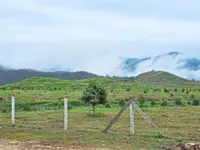IN the heart of Raub, Pahang, where jungle paths curve alongside rivers and clouds linger low over the durian trees, lives a man named Ezra and his 103-year-old mother. A proud member of the Semai tribe, Ezra has made a home for his family on the fringes of the Naza Agro Plantation – land where tradition and toil walk hand in hand.
“I’m from Kampung Ulu Ruai,” he says with quiet pride. “By the river.”





